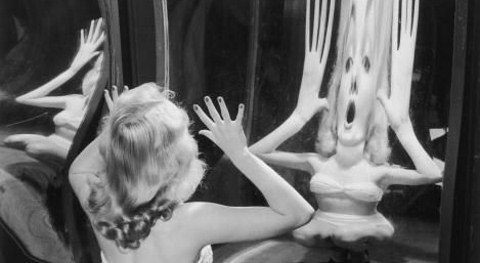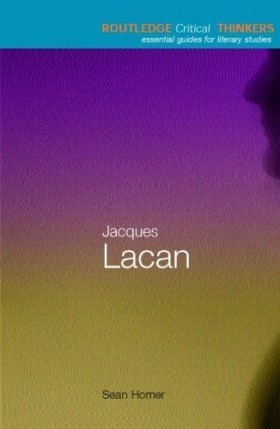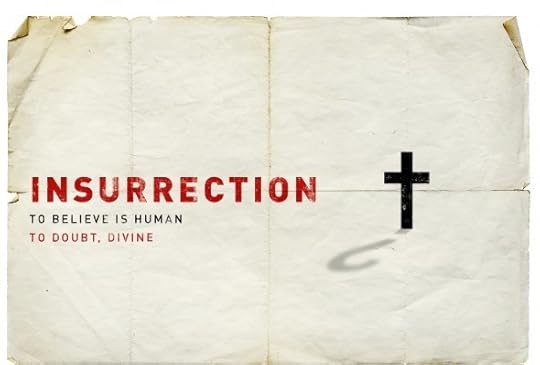Peter Rollins's Blog, page 52
August 12, 2011
Soularize, San Diego
This looks like it is going to be a great event that promises to, "stretch your mind, fill your heart, and encourage you toward the future". The speakers include Jay Bakker, John Caputo, Philip Clayton, Barry Taylor and more. Think this will definitly be one to remember.
August 11, 2011
How To Cut Up The Bible Without Anyone Noticing
From when we are young we develop a narrative that helps us understand who we are, who we are becoming and why we are here, a narrative that we largely adopt from our parents and then develop gradually over time.
Perhaps more interesting than what this narrative says is what it avoids saying, what it does not symbolise. For while we come to see this story as describing who we are it often has nothing to say about certain behaviours we engage in. There are behaviours that we enact which we treat as taboo in that they exist and yet remain unspoken. This is somewhat analogous to a family who never speak about an affair that everyone knows took place. It is a reality that has not been given form in the discourse of the family. In a similar way there are things we do that clash with the clean, coherent and cohesive story that we have about ourselves. Acts that are patently real and yet not acknowledged as such. By definition these are very hard to see because they are parts of our personality that have not been brought to the light. In order to find them we often need others to reflect back what they see. These kinds of encounters can be described as wounds from a friend because they are difficult conversations that expose something we would prefer not to acknowledge, yet they are required if we hope to grow and mature. When confronted with our taboos we can initially be astounded and then engage in an act of rationalisation in which we try to deny the truth of what has been pointed out.
An example will help. Often tabloid talk shows operate with a similar logic. Someone is brought onto the show, often thinking they are there for a reason other than the true one, and confronted with some problematic behaviour. They may have a problem with overeating, aggression or drug abuse. In such situations the individual might initially be shocked and surprised by the accusations (having never articulated the material reality themselves). Then there is often a point where the person considers what is being said but dismisses the accusations (claiming they are false) or defends themselves (claiming the actions were justified and can be explained within the coordinates of their current self-understanding). However, sometimes after the initial shock and defence the individual might break down and admit that they have a problem, at which point they are often offered professional help by the presenter. Of course by using this example I am not defending such shows, in fact I would be concerned about their effect for what they attempt to do is take a number of key moments in the process of human change and make them all happen in a 20min slot for entertainment. This however makes them useful in seeing how disavowal (not seeing what one sees), defence (trying to justify oneself) and acknowledgement (bringing ones own behaviour before oneself) operate.
We can see the same logic at work with the way that many people read the Bible today. For large numbers of churchgoers it is presented as a clean, coherent and cohesive text, an image that we tend to adopt for ourselves. Then, depending upon what we think the message of the text is, we simply refuse to see anything that might contradict our reading. We thus treat those parts of the text that might contradict our interpretation as taboo. In other words we see them without acknowledging them, we look at them in much the same way as a cow gazes at a passing car. When we are confronted with the broken nature of the text and the way in which we have repressed some parts of it at the expense of others we can often be shocked. Talking with young Evangelical Christians about the text I have often found this reaction. They simply never thought it was possible even though they have read the text a number of times themselves. When the facts are presented there can often be an anxiety and even hostility as they either explicitly avoid looking at the evidence provided or attempt to find ways of integrating the new information with their already existing worldview. Finally however there can be a point of recognition that opens up a different way of approaching and engaging with the text.
There have been various attempts by the liberal tradition within Christianity to remove parts of the Bible that they don't agree with (e.g. the Jefferson Bible), something that conservative Christians have vehemently attacked. However the truth is that the conservative Christians simply engage in a different, more clandestine, form of deletion. One that doesn't require physically cutting up the text: they do the cutting internally.
Philosophically speaking the claim that the Bible in its entirety is literal and inerrant (i.e. self-evident, internally coherent, and a reflection of the mind of God) operates as a 'master signifier'. This means that it is a claim without any specific content that is worn as a badge to let you know what team you play for. It doesn't matter too much how you actually fill in this empty container as long as you make the claim. It functions then as a shibboleth that identifies you as being in a certain tribe.
For as soon as one attempts to actually enact what it might mean to hold the bible as literal and inerrant (i.e. to fill this claim with content) one must treat large parts of the text as taboo. What becomes clear is that the person who makes the abstract claim that the bible is literal and inerrant, when enacting the claim, always refutes themselves.
August 9, 2011
Encountering the Monster That I Am
At various times I have discussed the idea of encountering our own monstrosity through an encounter with the other. Recently someone asked me to give a concrete example to help her understand what I meant. I wanted to offer something rather mundane, something that would not expose me too much. But I could not deny that one situation overshadowed all the others. It was something that happened when I was in my early twenties. An event that I am, understandably, very embarrassed about.
One evening I was with a group of dear friends in a dingy bar in Belfast. As usual our conversations jumped around from the sublime to the ridiculous. I can't remember now what the conversations were, but I do remember one point where someone said "that is so gay" to a comment from one of those in the group. This comment was then repeated a number of times at various points in the evening, probably even by me, although I don't recall (no doubt because I don't want to).
A few days later I happened to be out with one of the people who was part of that group. We were just catching up and having small talk when he stopped mid sentence, looked right at me, and said, "Pete, I am gay, can you imagine how I must have felt when everyone started using the term 'Gay' to describe what they thought was unmanly and embarrassing the other night."
At that moment I was undone. I wanted to defend myself by pointing out my disgust with homophobia, by telling him that I would never align myself with anyone who had an issue with same sex relationships and that I think those who would misuse a pseudo philosophy, psychology or theology to justify their inherent prejudices ought to be exposed in their game of rationalisation. Yet I could not in all honesty do it. Instead I was brought to silence. I saw myself through the eyes of my friend, and I could not believe what I saw. I saw a monster.
It was only because I was given grace and understanding in that moment that I was able to face myself. This was a moment of crisis in that it was a moment in which I had to choose whether to defend myself or acknowledge the truth of what had been presented to me, horrible though it was.
So often we avoid confronting our own monstrosity by covering it over and avoiding anyone who might expose it. But it is the other who so often holds the key to our development. Not by presenting us with some new information, but rather by presenting us with something we already are, something we refuse to acknowledge.
August 8, 2011
Changing the Structure
This is an excerpt from a session at Poets, Prophets and Preachers where Rob Bell interviewed me about my work. The full interview is available in my forthcoming book Insurrection
August 4, 2011
On Not Knowing What To Do
This is an excerpt from a session at Poets, Prophets and Preachers where Rob Bell interviewed me. Here I talk about the idea of not knowing what to do, and doing it. The full interview is available in my forthcoming book Insurrection
August 1, 2011
Suspended Space
This is an excerpt from a session at Poets, Prophets and Preachers where Rob Bell interviewed me. Here I talk about the idea of suspended space. The full interview is available in my forthcoming book Insurrection
July 25, 2011
July 16, 2011
A fight is brewing: How (Not) to Speak of God vs. Insurrection
As I prepare for the launch of my new book a good friend has been pushing me to do a series of podcasts. He is suggesting that the first few concentrate on How (Not) to Speak of God while the subsequent episodes offer a chapter-by-chapter discussion of the latest one. The idea appeals to me, so I have started re-reading How (Not) to Speak of God in preparation.
But in doing so I have discovered something very disturbing. I have uncovered the reality that these two siblings are squaring up for a fight; a fight over the nature of faith and the future of Church.
Interestingly both jump off from the same location and both attempt to land in the same field. But between these two points a large conflict between them exists.
In many respects this means that the best critical companion to Insurrection is Now (Not) to Speak of God and visa versa.
Part one of How (Not) to Speak of God begins with the line,
"Christian faith, it could be said, is born in the aftermath of God"
Upon hearing this Insurrection would no doubt shout out with a wholehearted "Amen" (as well as secretly wishing he had started with that line). Yet they both go on to interpret what "aftermath of God" actually means in radically divergent ways. Indeed the kernel of the two books can be seen as offering an interpretation of that phrase and its importance.
The more I listen to these rivals the more I think that it might be interesting to give some talks where they are placed side by side and allowed to slug it out.
Jacques Lacan
Jacques Lacan is one of the most challenging and controversial of contemporary thinkers, as well as the most influential psychoanalyst since Freud. Lacanian theory has reached far beyond the consulting room to engage with such diverse disciplines as literature, film, gender, social theory and theology.
Those wanting to gain a foothold in the great edifice of his thought will find this book invaluable. It is one of the clearest introductions to his work out there.
July 15, 2011
Talking about an Insurrection
In the coming months I am planning a few different things that will be tied in with the launch of Insurrection. Top of the list is hitting the road with the Rev. Vince Anderson for a dirty gospel tour through the bible-belt. In addition to this I am looking forward to speaking at various festivals and grass-roots communities. But in the midst of this I am also keen to work with students interested in the intersection between theology, philosophy and faith. If you represent an institution that might be interested in having me speak then click on the following link for more information… Academic tour info
Thanks
Peter Rollins's Blog
- Peter Rollins's profile
- 314 followers









